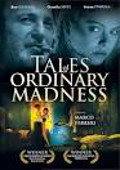
Italy/France 1981
Directed by
Marco Ferreri
97 minutes
Rated R
Reviewed by
Bernard Hemingway

Tales Of Ordinary Madness
Marco Ferreri’s film was adapted by the director with Sergio Amidei and Anthony Foutz from Charles Bukowski's 1972 collection of autobiographical short stories "Erections, Ejaculations, Exhibitions, and General Tales of Ordinary Madness". It is a film that will be of principal interest to devotees of the American “Beat” scene, a world that celebrates the boho/hobo nexus of high art and low life, Baudelaire and Bowery bums.
Ben Gazzara plays the Bukowski alter-ego, Henry Chinaski, here called Charles Serking (at the time, the director Taylor Hackford owned the rights to the Chinaski name, having acquired them when he optioned Bukowski's 1971 novel "Post Office"), a drunken poet whose life is devoted to booze, womanising and writing.
The film starts winningly with a droll sequence in which an inebriated Serking recites his meditation on style at some sort of college performance event before stumbling backstage, feeling up a supposed 12 year old girl, getting ripped off, fighting with his nymphomaniacal ex-wife and raping a trashy blond he follows home. All grist to the mill for our poet, played by the laconically-smiling cult favourite, Ben Gazzara, a kind of Cosmo Vitelli (his character in Cassavete’s 1976 film, The Killing Of A Chinese Bookie) on the skids.
Ferreri, a director well-disposed to such perverse lifestyle choices (his best-known film, La Grand Bouffe was about a group of terminally bored middle-class men getting together to eat themselves to death), goes to the material with relish although the problem with the film is that it is largely devoted to debauchery and misery we get very little sense of Serking/Chinaski the writer. Even here, there is a kind of European gloss, especially because of the casting of the improbably beautiful Ornella Mutti as Serking's lover, a self-mutilating hooker with whom Serking gets involved, almost segueing into some sort of cinematic fantasy that makes sense within Serking’s romanticising imagination but not the film as a more or less realistic portrait of Bukowski’s world, which is or should have been its main drive
Want something different?





